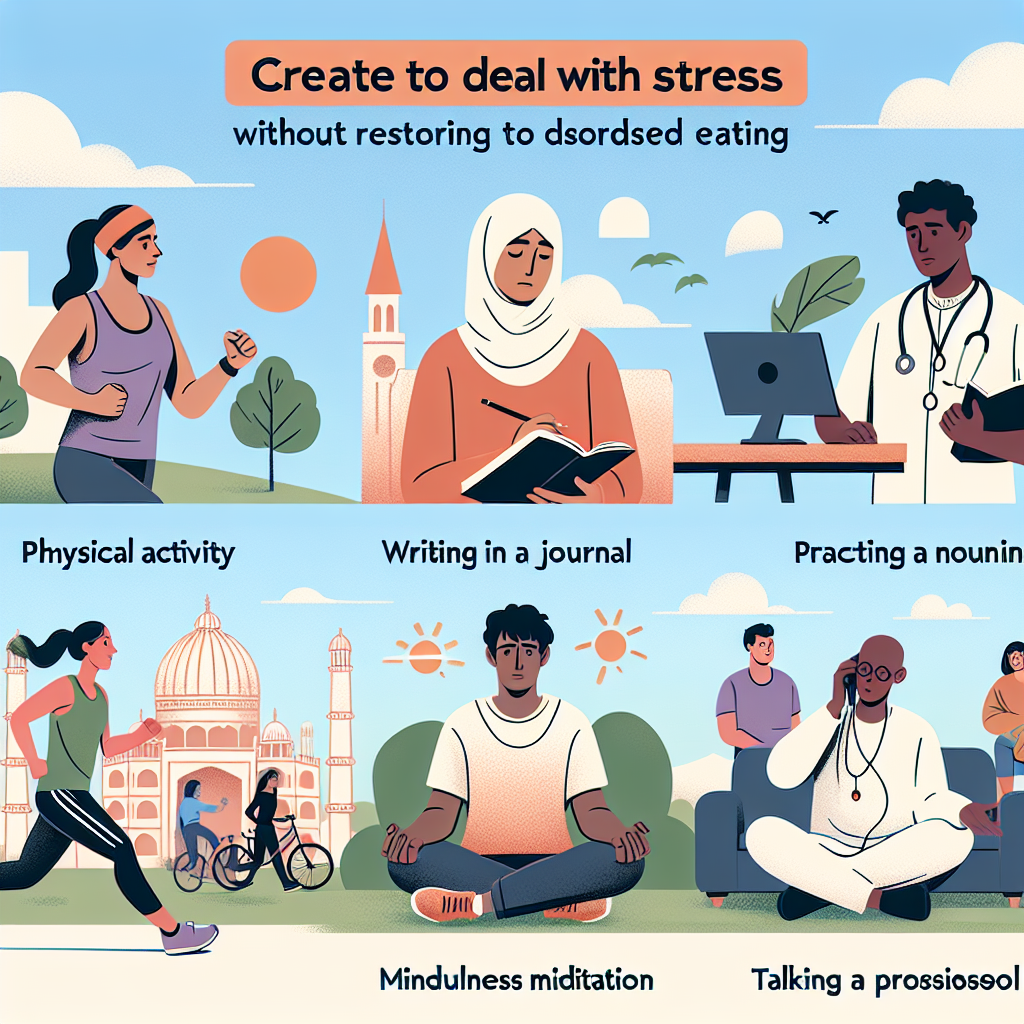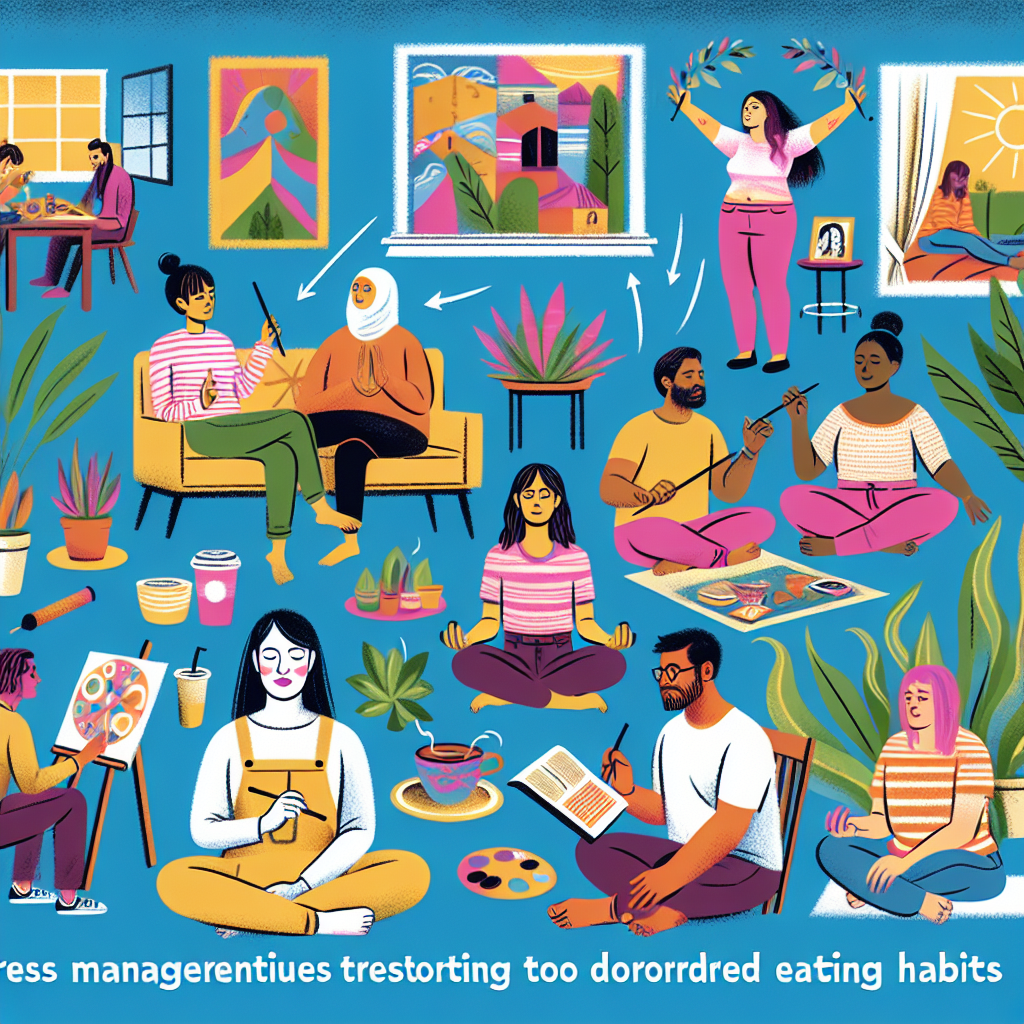-
Table of Contents

“Find Balance: Healthy Strategies for Managing Stress Without Disordered Eating”
Introduction
Stress is an inevitable part of life, but how we manage it can significantly impact our overall well-being. For many, stress can trigger unhealthy coping mechanisms, including disordered eating. Disordered eating encompasses a range of irregular eating behaviors that may or may not warrant a diagnosis of a specific eating disorder. These behaviors can include binge eating, restrictive dieting, or using food as a primary source of comfort. While these actions might provide temporary relief, they often lead to long-term physical and emotional consequences. Learning to cope with stress in healthier ways is crucial for maintaining both mental and physical health. This introduction will explore various strategies to manage stress effectively without turning to disordered eating, emphasizing the importance of self-awareness, healthy habits, and professional support.
Mindfulness Techniques to Manage Stress and Avoid Disordered Eating
In today’s fast-paced world, stress has become an almost inevitable part of daily life. While some stress can be motivating, chronic stress can lead to unhealthy coping mechanisms, including disordered eating. However, by incorporating mindfulness techniques into your routine, you can manage stress more effectively and avoid falling into the trap of disordered eating.
Mindfulness, the practice of being present and fully engaged in the moment, can be a powerful tool in combating stress. One of the most effective ways to incorporate mindfulness into your life is through mindful breathing. When you feel overwhelmed, take a few moments to focus on your breath. Inhale deeply through your nose, hold for a few seconds, and exhale slowly through your mouth. This simple exercise can help calm your mind and reduce stress levels, making it less likely that you will turn to food for comfort.
Another beneficial mindfulness technique is mindful eating. This involves paying full attention to the experience of eating, from the taste and texture of the food to the sensations of hunger and fullness. By eating mindfully, you can develop a healthier relationship with food and become more attuned to your body’s needs. This can help prevent emotional eating, which often occurs when we eat in response to stress rather than hunger.
In addition to mindful breathing and eating, practicing gratitude can also help manage stress. Taking a few moments each day to reflect on the things you are grateful for can shift your focus away from stressors and towards positive aspects of your life. This shift in perspective can reduce feelings of anxiety and help you approach challenges with a more balanced mindset.
Furthermore, engaging in regular physical activity can be an excellent way to manage stress. Exercise releases endorphins, which are natural mood lifters. Whether it’s a brisk walk, a yoga session, or a dance class, finding an activity you enjoy can provide a healthy outlet for stress and reduce the likelihood of turning to food for comfort.
It’s also important to establish a support system. Sharing your feelings with friends, family, or a therapist can provide emotional relief and help you gain new perspectives on your stressors. Sometimes, just knowing that you are not alone in your struggles can make a significant difference in how you cope with stress.
Additionally, setting realistic goals and priorities can help manage stress levels. Break tasks into smaller, manageable steps and focus on one thing at a time. This approach can prevent feelings of being overwhelmed and reduce the temptation to use food as a coping mechanism.
Lastly, ensure you are getting enough sleep. Lack of sleep can exacerbate stress and make it more difficult to manage emotions. Establish a regular sleep routine and create a restful environment to improve the quality of your sleep.
In conclusion, while stress is an unavoidable part of life, it doesn’t have to lead to disordered eating. By incorporating mindfulness techniques such as mindful breathing, eating, and practicing gratitude, along with regular physical activity, a strong support system, realistic goal-setting, and adequate sleep, you can manage stress more effectively. These strategies not only help in reducing stress but also promote overall well-being, enabling you to lead a healthier, more balanced life. Remember, the journey to managing stress and avoiding disordered eating is ongoing, but with mindfulness and self-compassion, it is entirely achievable.
Healthy Coping Mechanisms for Stress to Prevent Disordered Eating
Stress is an inevitable part of life, and how we cope with it can significantly impact our overall well-being. Unfortunately, many people turn to disordered eating as a way to manage their stress, which can lead to a host of physical and mental health issues. However, there are healthier ways to cope with stress that do not involve compromising your relationship with food. By adopting these strategies, you can navigate stressful situations more effectively and maintain a balanced lifestyle.
One of the most effective ways to manage stress is through regular physical activity. Exercise releases endorphins, which are natural mood lifters. Whether it’s a brisk walk, a yoga session, or a high-intensity workout, physical activity can help clear your mind and reduce stress levels. Additionally, engaging in regular exercise can improve your sleep quality, which is often disrupted during stressful periods. Better sleep can, in turn, make you more resilient to stress.
Another powerful tool for managing stress is mindfulness and meditation. These practices encourage you to stay present and focused, helping to reduce anxiety and prevent your mind from wandering into stressful thoughts. Mindfulness can be as simple as taking a few deep breaths and paying attention to your surroundings. Meditation, on the other hand, often involves sitting quietly and focusing on your breath or a mantra. Both practices can help you develop a more balanced perspective and reduce the urge to turn to food for comfort.
Social support is also crucial when dealing with stress. Talking to friends, family, or a therapist can provide you with different perspectives and emotional support. Sometimes, just knowing that someone is there to listen can make a significant difference. Social interactions can also serve as a distraction from stressors, giving you a much-needed break and helping you to return to the situation with a clearer mind.
In addition to these strategies, it’s essential to maintain a balanced diet. When you’re stressed, it’s easy to reach for comfort foods that are high in sugar and fat. However, these foods can lead to energy crashes and exacerbate stress. Instead, focus on a diet rich in fruits, vegetables, lean proteins, and whole grains. These foods provide the nutrients your body needs to function optimally and can help stabilize your mood.
Time management is another critical aspect of stress management. Often, stress arises from feeling overwhelmed by too many tasks and not enough time. By prioritizing your responsibilities and breaking them down into manageable chunks, you can reduce the feeling of being overwhelmed. Creating a schedule and sticking to it can also help you allocate time for relaxation and self-care, which are essential for maintaining mental health.
Lastly, don’t underestimate the power of hobbies and leisure activities. Engaging in activities that you enjoy can provide a much-needed escape from stress. Whether it’s reading, painting, gardening, or playing a musical instrument, these activities can help you relax and recharge. They also offer a sense of accomplishment and satisfaction, which can boost your mood and reduce stress.
In conclusion, while stress is an unavoidable part of life, how you choose to cope with it can make all the difference. By incorporating regular physical activity, mindfulness practices, social support, a balanced diet, effective time management, and enjoyable hobbies into your routine, you can manage stress in a healthy way. These strategies not only help you cope with stress but also prevent the development of disordered eating habits, leading to a more balanced and fulfilling life.
Q&A
1. **Question:** What are some healthy coping mechanisms for stress that do not involve food?
**Answer:** Exercise, mindfulness meditation, journaling, deep breathing exercises, and engaging in hobbies or creative activities.
2. **Question:** How can one identify and address emotional triggers that lead to disordered eating?
**Answer:** Keeping a journal to track emotions and eating patterns, seeking therapy or counseling, practicing self-awareness and mindfulness, and developing a support system of friends and family.
Conclusion
To cope with stress without resorting to disordered eating, it is essential to develop healthy coping mechanisms such as regular physical activity, mindfulness practices like meditation and deep breathing exercises, maintaining a balanced diet, seeking social support from friends and family, and possibly engaging in professional therapy. Building a routine that includes self-care activities, setting realistic goals, and practicing self-compassion can also help manage stress effectively. By adopting these strategies, individuals can address the root causes of their stress and improve their overall well-being without turning to disordered eating behaviors.



